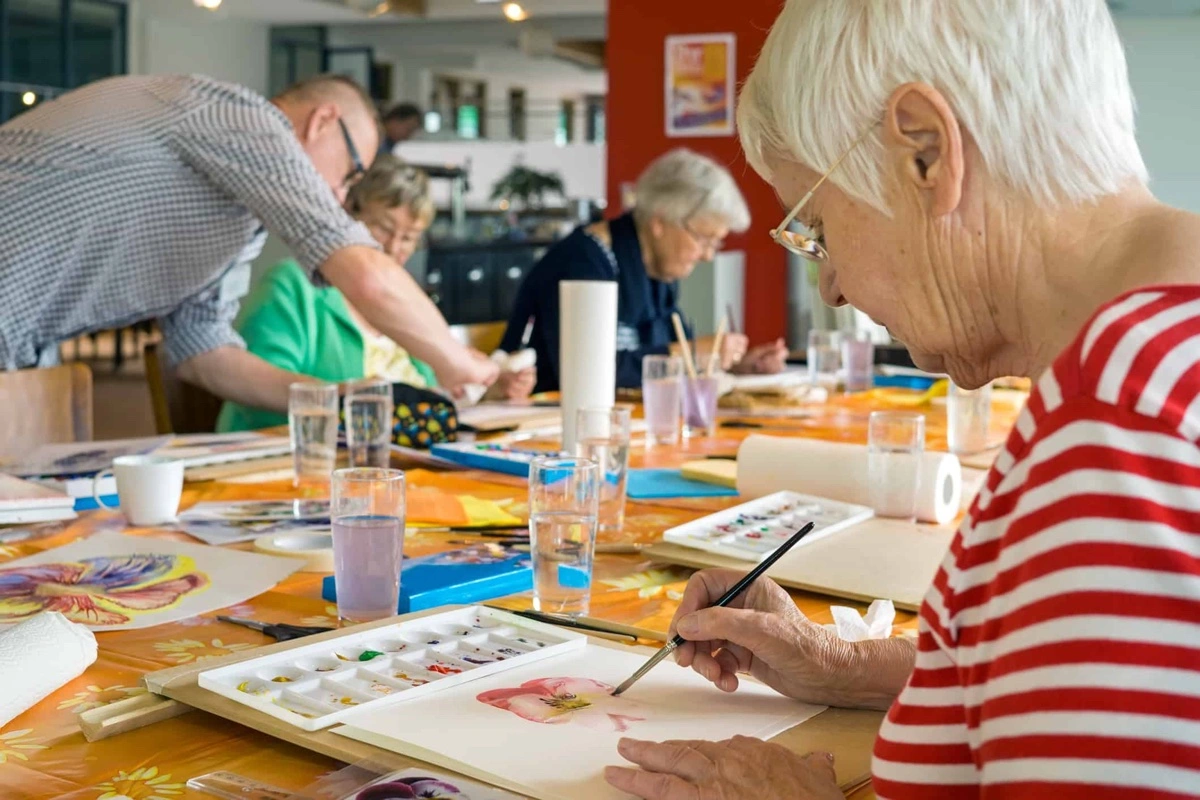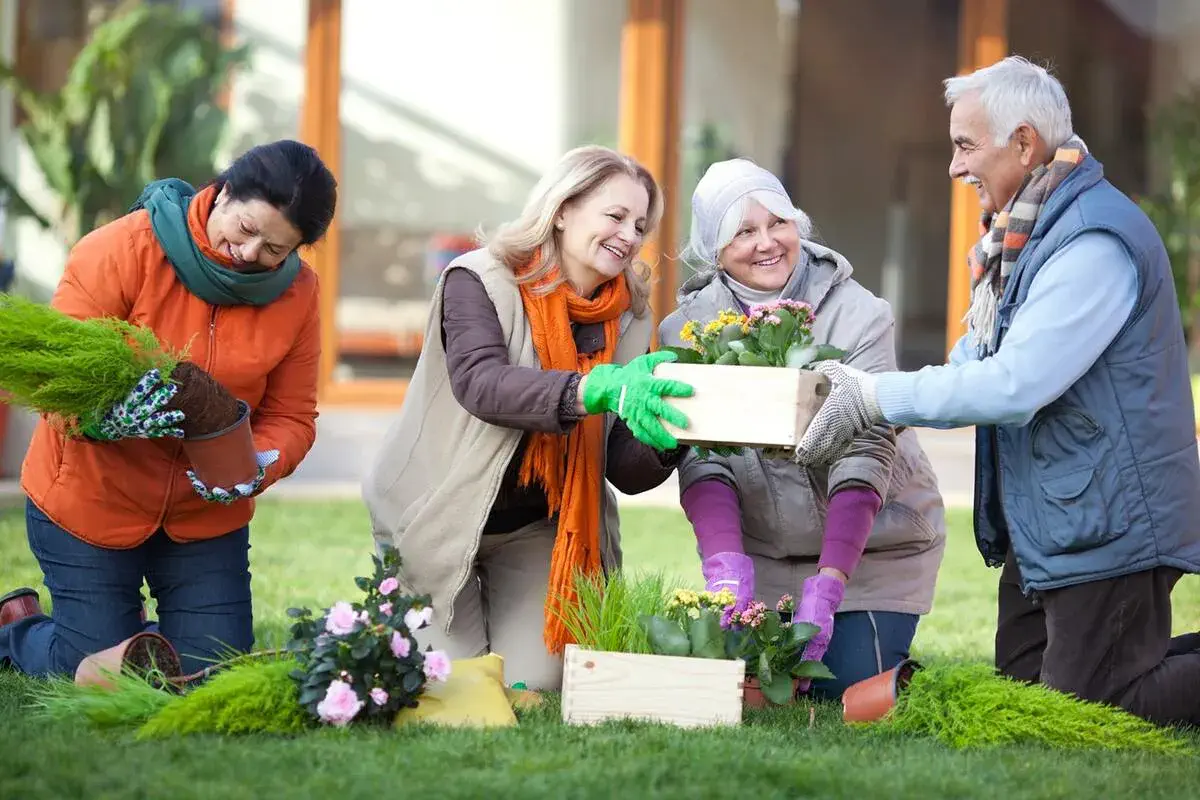
List of Group Activities for Seniors in Nursing Homes
Group activities are highly important for seniors and can have a positive impact on both their physical and mental health. Some of these benefits include improved mental well-being, enhanced cognitive function, reduced risk of depression and anxiety, increased self-confidence, greater resilience and mindfulness, and overall better physical health. Participating in group activities for seniors in nursing homes can increase their feelings of satisfaction and spirituality and prevent social isolation and loneliness.
Group activities can also help reduce the risk of depression and anxiety and strengthen the sense of connection and worth in seniors, which in turn improves their quality of life. Engaging activities that seniors can enjoy in residential aged care come in many forms, such as group exercise classes, group walking, gardening, educational and art classes, mind games and puzzles, group outings, and more. It is essential to choose activities based on the seniors’ physical and mental conditions as well as their personal interests.
In this article from the humanhealthmag, we will explore nursing home activity ideas & various types of group activities suitable for seniors in nursing homes, the benefits of these activities, and strategies for overcoming the challenges seniors may face in participating in them.
Group Activities for Seniors in Nursing Homes
As we age, it often becomes more difficult to engage in activities we once enjoyed—whether due to illness or limited mobility—which can impact our quality of life. Fortunately, there are many alternative options to stay engaged in everyday living. Whether you’re someone affected by health challenges or a caregiver for a loved one, the following list should offer some helpful ideas for both individual and group activities for seniors.

Social and Interactive
Social and interactive group activities for seniors in nursing homes are highly beneficial for seniors and can greatly improve their quality of life and mental well-being. Some of these interactive activities include:
Discussion Groups
Forming discussion groups on various topics such as book reading, history, or music provides opportunities for conversation, exchange of ideas, and strengthening social connections. Reading is a wonderful activity for seniors—it’s an enjoyable way to pass time and keep the brain engaged. It can also enhance memory, reduce stress, improve sleep, and delay dementia or cognitive decline.
Seniors can enjoy reading physical books, magazines, using e-readers, or listening to audiobooks. These options allow them to immerse themselves in great stories, look at pictures, or learn something new. Organizing book clubs or storytelling circles among senior friends is another enjoyable way to combine reading and socializing.
Gentle Fitness Clubs
Participating in gentle fitness group activities for seniors in nursing homes like yoga, Pilates, Tai Chi, or walking groups can help improve both physical and mental health while providing opportunities to meet new people. Whether sitting or standing, seniors can still benefit from seated exercises or chair yoga programs. There are also hobbies for elderly with dementia and specific activities for nursing home residents with dementia that use walkers for balance or focus on the feet and ankles to reduce swelling. For seniors with limited mobility looking to manage their weight, regular physical activities for elderly with limited mobility—burning more energy than consumed—is essential.
Art Workshops
Connecting with their creative side is another enjoyable way for seniors to spend time in nursing homes. Drawing, coloring, painting, and sculpting are all effective methods of expressing creativity. Fun projects may include creating scrapbooks, organizing family photo albums, or compiling family recipe books.
Participating in artistic activities like painting, pottery, knitting, gardening, or cultural events like theater, cinema, concerts, or art exhibitions can increase joy and community engagement. There are also many hobbies suitable for seniors with limited mobility, such as cooking, bird watching, knitting, indoor gardening, playing musical instruments, or learning a new language.
Group Games
Mind games and puzzles are a fantastic source of entertainment and joy for seniors. There are many games to choose from, most of which can be played in groups, while some are also suitable for solo play. Group games for seniors in nursing homes like chess, backgammon, card games, and other brain games like puzzle-solving can help strengthen memory and cognitive skills.
Group Outings
Organizing day trips or short visits to local attractions like museums, parks, historical sites, and more offers a great opportunity for fun and memory-making. If travel tips for seniors are done correctly, traveling with seniors will be safe. Spending time outdoors and enjoying nature is calming and uplifting—perfect for boosting mood and entertaining seniors. Even if a senior has limited mobility and can only reach the porch or sit by a large window, getting fresh air or simply watching the scenery is a wonderful daily activity.

Educational and Learning Activities
Learning new knowledge is a proven way to keep the brain engaged. Some community centers and organizations offer educational workshops where seniors can benefit from both scientific and cultural activities. Retirees who have spent their entire lives working now have the opportunity to explore their creative side. Help them discover their favorite art field and encourage them to join group art classes. Not only will they be entertained, but they’ll also make new friends and enjoy pleasant moments together.
Learning becomes fun when you start something new. Follow your interests, discover your motivations and passions. Learning new things is beneficial at any age—from learning a new language and playing musical instruments to using a computer or cooking new dishes, all are suitable activities for seniors. Remember, learning has no limits—you can learn anything at any age.
Participating in educational classes such as learning a new language, crafts, or computer can help keep the mind active, provide new opportunities for social interaction, and strengthen a sense of usefulness and social connection in seniors. The following educational and learning group activities for seniors in nursing homes can contribute to improving quality of life and maintaining mental health for the elderly:
Foreign Language Classes
Learning a new language such as German or French can keep the mind sharp and open up new opportunities for social interaction.
Cooking Classes
One of the most enjoyable and beneficial activities for seniors is learning to cook a variety of healthy and delicious meals.
Computer Training
Becoming familiar with modern technology and using the internet can help seniors stay connected with the digital world and virtual reality for elderly and benefit from various online services.
Creative Writing Classes
Joining writing classes for storytelling, poetry, or memoir writing can boost creativity and bring a sense of fulfillment and inner peace.
Music Classes
Learning music, singing, playing an instrument, or participating in a choir group are all fun & exciting nursing home activities to uplift the spirit and maintain emotional vitality in seniors.

Group Activities for Seniors in Nursing Homes: Volunteering
Even if a senior is not very mobile or mostly homebound, they can still remain socially active. This is an excellent way to stay engaged and feel a sense of purpose and accomplishment. Collaborating with local charities, hospitals, or religious organizations can be highly beneficial for improving morale and capability.
Examples of such activities include knitting or crocheting blankets or hats, sewing, or helping prepare care packages for those in need. Volunteering gives seniors a sense of purpose and strengthens their social connections. Here are some volunteer activities suitable for seniors that can boost their spirits and provide a sense of usefulness:
- Helping Charitable Organizations
Seniors can volunteer at charities and nonprofit organizations by participating in tasks such as packaging food, organizing blood drives, supporting children and women without guardians, or assisting those in need.
- Teaching and Supporting Children
Helping children with homework or reading stories aloud are simple yet joyful tasks seniors can easily do. They also have the chance to share their knowledge and life experiences with younger generations.
- Caring for Animals
Another meaningful activity for seniors is caring for animals. They can also visit animal shelters and participate in programs that support and care for animals in need.
Outdoor Activities for Seniors in Nursing Homes
Gardening: One excellent opportunity to enjoy fresh air is gardening. Planting flowers, watering the garden, and weeding are wonderful pastimes for seniors to take their minds off the hustle and bustle of daily life. Seeing the flowers bloom or using the vegetables they’ve grown will be very enjoyable for everyone.
Animal Therapy (Pet Therapy): Animals, just like us humans, need love and happiness. Consider that playing with animals brings joy to both sides. It can be clearly stated that pets play a significant role in entertaining older adults, which is why many people like to keep animals in nursing homes (of course, if the nursing home’s policies allow it).
Most people feel better from physical contact with animals and petting them. This option will be even more appealing to those who have had pets before. If keeping a pet is difficult for you, you can arrange a meeting with a pet owner and spend a few hours a week with their pet. Animal therapy (pet therapy) has a positive effect on the physical and mental health of elderly individuals.

Visiting Friends and Family: These days, everyone has their own concerns. However, you can spend the best moments by spending hours talking with friends or family members. You can have lunch or visit a local park and spend the evening socializing with old friends.
With this entertainment idea, older adults can talk about their memories, reminisce about the past, and even discuss their shared interests. In fact, a conversation that takes place in a friendly environment improves people’s spirits and outlook more than anything else. Therefore, participating in these kinds of friendly gatherings is highly recommended, and its importance for seniors outweighs any game or entertainment.
Challenges of Group Activities for Seniors and How to Overcome Them
Due to the unique physical and mental conditions of seniors, participating in group activities for seniors in nursing homes can come with certain challenges. However, with the right strategies, these challenges can be effectively managed.
One major challenge is physical limitations. Many seniors may suffer from issues such as joint pain, muscle weakness, or chronic illnesses, which can prevent them from taking part in group activities. Therefore, it’s essential to choose activities that are appropriate for their physical capabilities. Selecting activities that align with the physical abilities of seniors can help minimize physical discomfort and enable more active participation.
Another common issue is fear of participating in group activities and social isolation. This can be addressed by creating a safe, calm, and supportive environment. Starting with small, familiar groups can also help ease this fear. A friendly and supportive atmosphere where seniors feel comfortable and secure can significantly increase their motivation to join in group activities.
Financial concerns and costs can also pose a challenge, as some group activities may be too expensive for seniors with limited income. To address this, free or low-cost activities can be offered as an affordable and inclusive alternative.
Concluding Remarks
In this article, we discussed the impact and importance of group activities for seniors in nursing homes. We also introduced various types of these activities and explained their benefits. Participating in group activities is extremely important and impactful for seniors and can contribute significantly to improving their quality of life and overall health.
Families, senior caregivers, and nurses play a crucial role in encouraging and supporting older adults to take part in group activities. Encouragement from loved ones can increase seniors’ motivation to participate and strengthen their sense of responsibility and self-worth. Engaging in social and group activities can help seniors maintain physical and mental activity levels, leading to improvements in both their psychological and physical well-being. It also brings a sense of meaning and value to their lives and helps prevent social isolation.
Group activities provide opportunities to build and strengthen social connections, which can reduce feelings of loneliness and increase a sense of belonging. These kinds of activities help lower the risk of depression and anxiety while enhancing a sense of connection and self-worth among seniors. If you have any experiences related to this topic, we would love for you to share them with us.

Frequently Asked Questions
What are the best recreational activities for illiterate seniors?
Watching movies, engaging in light exercise, and enjoying outdoor activities are great options. Watching TV all day is not considered a healthy pastime, but a good movie or a few selected shows can be an enjoyable part of the day or week. Watching television can even be paired with another specific hobby. For example, a senior might enjoy watching a documentary about a topic they are learning more about.
What entertainment items are suitable for seniors?
Crossword puzzles, magazines, movies, books, and chess are among the best entertaining items for elderly individuals.
